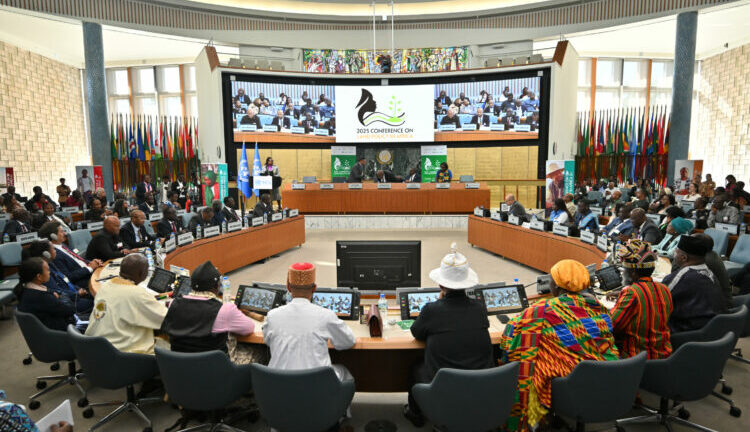By Busani Bafana | Addis Ababa, Ethiopia, 10 Nov. 2025 (IDN) – Former colonial powers must provide reparations to atone for land dispossession, a historical injustice that continues to constrain Africa’s social and economic development, a policy conference heard.
Mzwanele Nyhontso, Minister of Land Reform and Rural Development, Republic of South Africa the issue of colonial reparations was a major focal point of the current debates and efforts around land and development in Africa and the Diaspora.
“Reparation is a process of self-repair, healing and receiving compensation for the loss and pain caused by former colonisers and oppressors,” Nyhontso said in a keynote address to the sixth edition of the Conference on Land Policy in Africa (CLPA 2025) in Addis Ababa Ethiopia.
“Land dispossession is a clear example of such excesses, and we cannot evade the reality that those who viciously took land away from our indigenous peoples have a responsibility to atone and pay for such excesses.”
Africa has called for reparations for colonial wrongs and slavery. Noting the devastating impact of colonialism in land dispossession and the destruction of social and cultural development, the African Union has pushed for land restitution and the return of cultural artefacts looted from the continent as part of reparation for Africa.
Describing the land dispossession as one of the most important topics and phenomena of our time, Nyhontso said land was the foundation of food security,social and sustainable economic development and bedrock for social and political stability.
Since independence in 1994, the South African government has redistributed 5.9 million hectares of land with vulnerable groups being prioritized. Between 2019 and 2025, a total of 238 farms amounting to 362 000 hectares were allocated to various beneficiaries under the Proactive Land Acquisition Strategy (PLAS), the Minister Nyhontso said.
Under the country’s Restitution Programme, aimed at providing restitution of land rights for persons and communities dispossessed of such rights 83 614 land claims have been settled, which amounts to approximately 80 per cent of the total number of valid claims finalised since 1994.
The conference with the theme, “Land Governance, Justice and Reparations for Africans and Descendants of the People of the African Diaspora”, was organised jointly by the African Union Commission, African Development Bank and the Economic Commission for Africa (ECA).
Speaking at the same conference, Ambassador Amr Aljowaily, Director, Citizens & Diaspora Directorate at the African Union Commission underscored that land governance was not a technical matter but one of economic justice and peace.
Noting that the land was a simple instrument of justice and the struggle over land mirrored the struggle of governance and development.
Claver Gatete, United Nations Under-Secretary-General and Executive Secretary of the ECA bemoaned that Africa – a continent rich in land and resources – bore the heaviest burden from rising debt costs, climate-induced displacement and persistent inequalities.
Gatete questioned how a just and prosperous Africa can be built when the roots of historical injustice, that have constrained the continent’s development, remain unresolved.
“Land governance, justice and reparations are not debates of the past; they are imperatives for Africa’s renewal and the restoration of fairness in global systems.” Gatete said.
Gatete noted that Africa, despite being rich in land and other resources, has many people without secure access and equitable benefit from the land.
“Centuries of enslavement, colonization and dispossession reshaped our political economy and global position,” he charged. “The same extractive logic that once seized land now manifests in inequitable trade systems, inflated borrowing costs and credit assessments that undervalue Africa’s potential.”
According to research, Africa holds 30% of the world’s mineral reserves, 65% of its uncultivated arable land and the youngest population on earth but accounts for a small fraction of global trade. Africa contributes about 2% to world manufacturing output.
Gatete pinned current disparities to the legacy of structural imbalances shaping Africa’s role in the global economy.
“Reparations, therefore, must go beyond acknowledgment of the past. They must transform the systems that perpetuate inequality today.”
Calling for the reform of the global financial and trading architecture, Gatete observed that Africa was currently losing an estimated US$88 billion annually in illicit financial flows. Besides, unfair credit ratings inflate borrowing costs and constrain access to long-term capital.
A just order must include fairer credit assessments, debt-for-development instruments and stronger African financial institutions, Gatete urged, pointing to the need for strong land governance and tenure security on the continent.
Gatete entreated: “together, we can reclaim not only what was lost but also build what must last.”
Photo credit: Daniel Getachew

